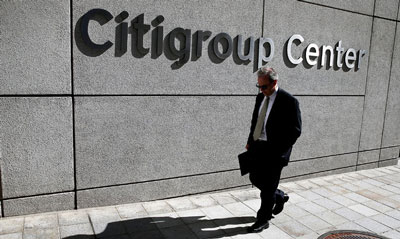Citigroup’s Sale of OneMain to Springleaf Hits Antitrust Obstacle

Springleaf agreed in March to buy OneMain from Citigroup
U.S. antitrust authorities have thrown a wrench into Citigroup Inc.’s plan to divest its subprime lending unit.
Five months ago, Citigroup said it would sell the business, known as OneMain Financial, to Springleaf Holdings Inc. for $4.25 billion. The transaction would be a milestone in the New York company’s yearslong effort to get smaller in response to regulators’ criticism it is too sprawling to manage effectively.
But the sale also would establish a new powerhouse in the politically sensitive world of lending to low-income Americans. On Thursday, Springleaf said the U.S. Department of Justice had “concerns” about the deal that could delay its closing, which originally was scheduled to be completed by Sept. 30.
Some investors and analysts, surprised by the news, worried that the deal could be delayed into 2016. Shares of Springleaf, based in Evansville, Ind., dropped 10%. Citigroup shares fell 1.1%, more than double the decline in the KBW index of bank stocks.
The hitch underscores the difficulty a banking giant like Citigroup can have shrinking itself. Selling the unit has been a goal of Citigroup’s since at least the financial crisis. The bank put the subprime lender on the chopping block as early as 2009.
Big lenders have been caught between trying to satisfy banking regulators who want them to shrink and antitrust regulators who want to preserve choice in the marketplace, which often diminishes with such deals. Citigroup’s OneMain and Springleaf compete with each other in some markets.
If the Justice Department’s concerns grow to the point that it blocks a deal, Citigroup would essentially have to start over and consider options such as selling shares of OneMain to the public or testing the waters to sell it to private-equity buyers.
Springleaf agreed to buy OneMain in March, a deal that promised to create the country’s biggest subprime lender. Both sides were viewed as benefiting: Springleaf would get scale, while Citigroup, led by CEO Michael Corbat, would add cash to its coffers and shed a business that at times has been prone to big losses and regulatory scrutiny.
In its filing Thursday, Springleaf said that the Justice Department and certain state attorneys general “have expressed to us potential concerns” with the proposed deal. The company had previously disclosed that the Justice Department’s Antitrust Division would review the merger.
Citigroup has had fits and starts in trying to sell the asset before. In an effort to make the unit more attractive to potential buyers, Citigroup changed its name—formerly CitiFinancial—and tightened its underwriting standards. But the bank’s plans to sell it to private-equity firms several years ago fell through when Citigroup couldn’t get a price it wanted, and because the private-equity firms worried that they wouldn’t be able to raise funding for a deal.
Before Citigroup signed the deal with Springleaf, Citigroup considered spinning off OneMain as a separate public company, but that option was viewed as riskier and potentially more time consuming.
On a call with analysts Thursday, Springleaf CEO Jay Levine described the merger as “pro-consumer” and the market for subprime lending as “highly fragmented and competitive.”
“We think there are 100 million-plus target customers,” Mr. Levine said on the call. “We’ll touch a couple million of them.”
Representatives for Citigroup and the Justice Department declined to comment.
Measuring the size of the subprime-lending industry is no easy task. The lenders don’t generally accept deposits, which are an easy metric for comparing banks. The American Financial Services Association, a trade group that includes both Springleaf and OneMain, doesn’t have overall statistics on the size of the U.S. subprime-lending market. A spokesman said that the bulk of its members are small, family-owned businesses.
Mr. Levine said Thursday he hoped the deal would close “as promptly as reasonably practical.”
“It’s just a matter of time, we hope, until Washington and the states understand where we’re coming from,” he said.
According to Springleaf, both it and OneMain met with the Justice Department and provided information voluntarily. Springleaf also said it had responded to a department request for information on the marketplace in which both companies operate.
Springleaf said it is premature to speculate on what the Justice Department could specifically ask it to do, if anything. Analysts said that the Justice Department could ask Springleaf to sell branches in regions where the two companies overlap heavily. Springleaf has previously said it expects to consolidate about 200 branches starting next year, but forced sales to competitors could affect the financial attractiveness of the deal for Springleaf and its majority owner, private-equity firm Fortress Investment Group.
For Springleaf, the deal means more than doubling its customer base, to 2.5 million accounts from 1.2 million, and its branches, to nearly 2,000 from 830.
For Citigroup, though, OneMain is only a fraction of overall assets. The unit, which suffered losses during the financial crisis, is now profitable, fueling Citigroup’s net interest margin because it charges high interest rates.
Meanwhile, much of the lending to risky customers that banks used to do has moved to the less-regulated world of hedge funds, private-equity firms and online lenders as regulators push banks out. Unlike Springleaf and OneMain, many of the other types of lenders don’t have branches, giving the potential merger partners an outsize brick-and-mortar presence.
John Hecht, an analyst at Jefferies Group LLC, said that an antitrust review is to be expected for two companies that are prominent in their field. A delay “gets people skittish,” Mr. Hecht said. “But we really don’t think anything meaningful has changed.”
Source: WSJ – Citigroup’s Sale of OneMain to Springleaf Hits Antitrust Obstacle




























